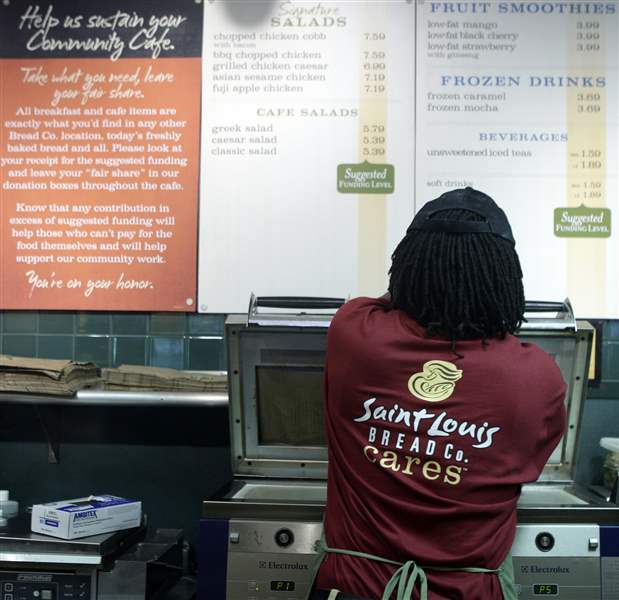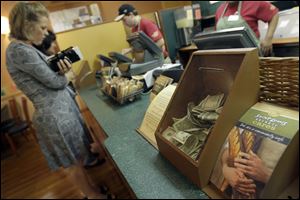
Panera experiment called a success
Panera says pay-what-you-want sites holding own
5/17/2011
An employee tends to an order in the Panera restaurant in Clayton, Mo., where the charitable concept started.
ASSOCIATED PRESS

After an order is picked up, a menu board at the checkout suggests the meal’s worth, and it is up to customers to decide how much money they can afford to put in the cash box before they leave.
CLAYTON, Mo. — Rashonda Thornton looked up at the menu on the wall, ordered a Caesar salad and dropped a $10 bill in a box. Pretty generous, considering the meal at Panera Bread Co.’s café in the St. Louis suburb of Clayton sells for less than $7.
It was a year ago that Panera converted the Clayton restaurant into a nonprofit pay-what-you-want restaurant with the idea of helping to feed the needy and raising money for charitable work. Panera founder and Chairman Ronald Shaich said the café, operated through Panera’s charitable foundation, has been a big success, largely because of people such as Ms. Thornton.
“Sometimes you can give more, and sometimes you can give less,” said Ms. Thornton, a teacher’s assistant. “Today was one of my ‘more’ days.”
Panera, based in suburban St. Louis, has long been involved in charitable giving, donating millions of dollars and giving away leftover food to the needy. But Mr. Shaich sought more direct involvement.
“We were doing this for ourselves to see if we could make a difference with our own hands, not just write a check, but really make a contribution to the community in a real, substantive way,” Mr. Shaich said.
What developed was the largest example yet of a concept called community kitchens, where businesses operate partly as charities. Panera’s success in Clayton has led it to open two similar cafés — one in Dearborn, Mich., and one in Portland, Ore. It plans to add a new one every three months or so.
The majority of customers pay retail value or more. Statistics provided by Panera indicate that roughly 60 percent leave the suggested amount, 20 percent leave more, and 20 percent less. One person paid $500 for a meal.
The Clayton restaurant could pass for any of Panera’s 1,500 cafés.
The difference is at the checkout. The menu board lists “suggested funding levels,” not prices. Payments go into a donation box, though the cashiers provide change and handle credit cards.
Not everyone is generous, but that’s OK with Brooke Porter, who manages the restaurant. She knows that times are still hard for many. She has seen families down on their luck come in to celebrate birthdays with a meal they normally couldn’t afford. A teacher laid off after 25 years stops by on his way to job fairs. He can’t afford to pay much but makes up for it by volunteering at the store.

An employee tends to an order in the Panera restaurant in Clayton, Mo., where the charitable concept started.
Only a few take advantage of the system — “lunch on Uncle Ron” as Mr. Shaich calls it. He still fumes over watching three college kids pay $3 for $40 worth of food. Generally, peer pressure prevents that sort of behavior, he said. “It’s like parking in a handicapped spot.”
Overall, the café performs at about 80 percent of retail and brings in revenue of about $100,000 a month. That’s enough to generate $3,000 to $4,000 a month above costs — money being used for a job training program for at-risk youths.
“We took some kids that typically wouldn’t be employable, didn’t know how to work in society,” Mr. Shaich said. “We gave them a combination of job training and life skills.” The first three graduates of the program are starting jobs at other Panera restaurants.
Mr. Shaich admitted he didn’t know how the pay-what-you-want experiment would pan out.
“The lesson here is, most people are fundamentally good,” Mr. Shaich said. “People step up, and they do the right thing.”